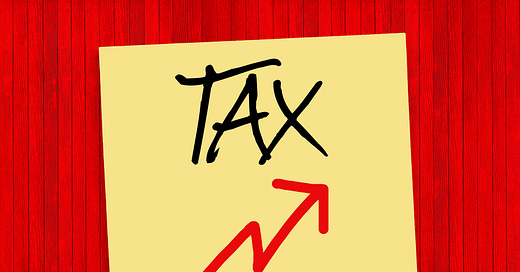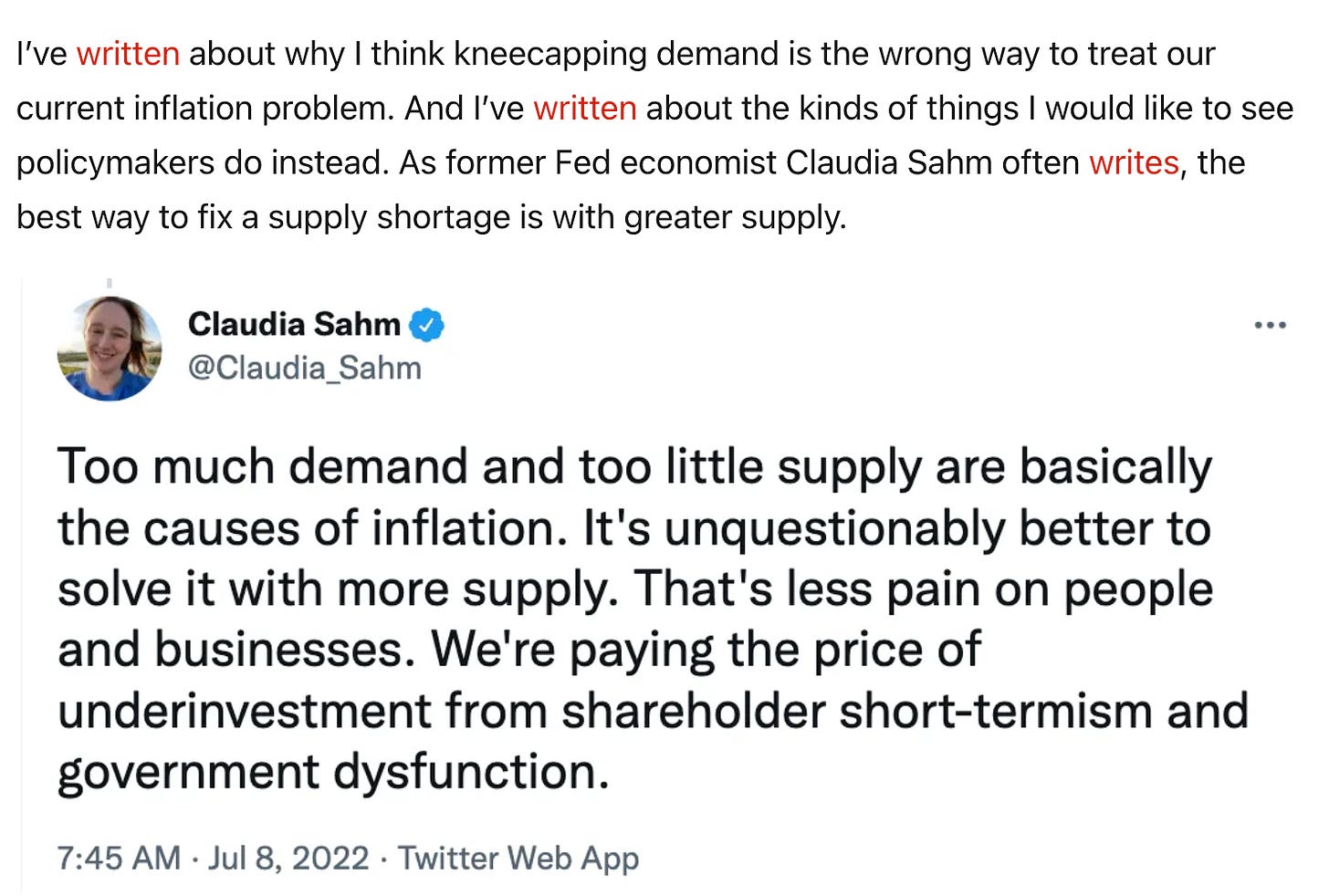Early this morning, I got an e-mail from a longtime friend, asking:
Isn’t the best way to rein in inflation right now a tax increase on those with what used to be called surplus incomes? Isn’t that the remedy MMT calls for?
If you’ve been reading The Lens for the last year or so, then you can probably anticipate at least part of my reply. As I’ve argued on countless occasions (here, here, here, here, here), the best way to rein in inflation is to unleash a suite of policies, tailored to address the specific drivers of our current problem. Choosing the right remedy requires correctly diagnosing the source(s) of the problem. Higher taxes might be a smart way to alleviate inflationary pressures. But raising taxes to fight inflation once it becomes a problem has never been “the remedy MMT calls for.”
Here’s a passage from The Deficit Myth:
What about inflation? And taxes? Can we trust Congress to make the right choices, at the right time, making productive investments when there is fiscal space and exercising the necessary restraint as resources become scarce? Perhaps I’m too cynical, but I’d like some kind of insurance policy (p. 237).
I go on to explain that the best way to deal with inflation is preemptively. Fighting inflation ex post—i.e. after it becomes a problem—will sometimes be necessary (like in wartime or when a global pandemic throws global supply chains out of whack), but MMT stresses the importance of mitigating inflation ex ante—i.e. before it takes hold. That can be done by strengthening the automatic stabilizers and incorporating inflation risk into the federal budgeting process (more on this tomorrow).
Back to my friend.
He wanted to know whether MMT tells us that raising taxes on the rich—i.e. people with “surplus incomes”—is the “best way” to rein in inflation?
Here’s a lightly-edited version of the reply I sent to him. (Incidentally, you can find all of this, less hastily articulated, starting on p. 32 of my book.)
In MMT, taxes are important for four big reasons:
1.) Taxes (or other forms of compulsory payment) are a good way to start up a currency from scratch, as history clearly shows. Define the unit of account. Impose tax liabilities payable in the state’s unit of account. A state that can make and enforce its tax laws can compel people to produce for the state (mercenaries, roads and other public works, crops, etc.) in order to get the “token” (state currency) that is needed to pay the tax. The imposition/enforcement of the tax is what gives the state’s otherwise (intrinsically) worthless currency value. Remember, the British government literally used to spend “tallies” (notched hazelnut sticks. Upon payment of taxes, the two sides of the stick (the “stock” and the “stub”) were matched up and the debt was paid. The sticks were then burned. Just as paper currency used to be burned once returned to the issuer. Beautiful short paper by Randy Wray covering this history.
2.) Taxes can mitigate inflation by reducing income. Every dollar taxed away from someone is a dollar they no longer have and cannot spend, chasing after goods/services. So taxes are one way to dampen inflationary pressures.
3.) Taxes are good for altering the distribution of wealth/income. Set the “need for revenue” completely aside. One might advocate a wealth tax, higher marginal rates, closing the carried-interest loophole, ending step-up-in-basis, etc. simply because one believes the outcomes (less inequality) are desirable.
4.) Taxes can incentivize/disincentivize . Again, forget about “revenue” (at the federal level, anyway). You might favor a carbon tax/gas tax/tobacco tax, etc because you believe it will discourage certain behaviors. Conversely, tax rebates on EVs, solar panels, etc. can be defended on grounds they will help support the transition to cleaner energy.
In MMT, we are never concerned with taxes as “revenue-raisers.” Indeed, legislation that would rely on, e.g., a tax on “Wall St. speculation” to “pay for” free college can be counterproductive. It hitches the (good) free-college wagon to the (bad) behavior of Wall St. speculation, making you dependent on not only ongoing Wall St. speculation over time but on increasing revenue from that activity to offset rising costs of sustaining the program.
Your question is really about 2.) above. So my response is …. Maybe. I write about this in the book. IF you believe that the current bout of inflation is primarily an “excess demand” problem (I do not), then raising taxes is one way to mitigate inflation. BUT (!!!!) you have to be sure you’re taking money away from people who would otherwise spend it!! Let me give you an extreme hypothetical to make the point — suppose you raise taxes on Elon M, Jeff B, and Bill G. Just the three of them. How much consumption spending do you think you will discourage? I strongly suspect the answer is something close to 0.0001 percent. For tax increases to have the desired impact, they have to hit people with a reasonably high “marginal propensity to spend.” Biden has pledged not to raise taxes by a single penny on anyone making <$400,000/yr. Raising taxes on people making, say, half-a-million will discourage some spending. But the farther UP the income/wealth ladder you climb, the less of an impact it will have.
A payroll tax increase, on the other hand, would smack exactly the right population, again IF you think excess demand is the root cause of the inflation. Which, again, I do not. And while it would pull income out of the hands of 100M+ people with a relatively high marginal propensity to spend, it would only increase the hardship as people struggle with higher interest rates and higher inflation.
A luxury tax on yachts, private jets, etc. would likely have some impact on spending in those categories, but it would also mean fewer jobs for the workers who help build those things. (But one could defend something like this on multiple grounds: 2, 3 and 4)
MMTers would defend —and have insisted upon!!!!—raising taxes on the rich, but we do it for reasons mostly related to 3) above.
So my position has not changed. As I wrote last month:
If you’re interested in a more complete look at the role of taxes in MMT, check out this video.





Big Oil kick started inflation just as they did in the 70s . Back then their enemy was independent oil companies , today it’s alternative energy and governments that invest in clean energy . Back then they brought the golden age of American capitalism to an end now they are part of a global right wing dark money movement to replace democracy. Back then they were called a bilateral symbiotic oligopoly. Today Big Oil and Putin are in their leadership .
"...the best way to fix a supply shortage is with greater supply."
OK. But what do you do when supply chain issues prevent the availability of greater supply--at least in the short term? Are we (the little people) supposed to be content with paying higher prices for stuff that can't be offset with higher wages? Why isn't "the best way to fix a supply shortage" the imposition of price controls enforced by the gov't? Maybe I've missed it, but I haven't read anything in the popular press that answers this question. After all, it's the power of the gov't that creates the money we covet and use to exchange for goods and services. Why is the gov't suddenly powerless when anyone suggests price controls? Desperate times call for desperate measures. Not for nothin', but price controls won WWII.
BTW, thanks for citing the Randy Wray talk. He is a genius and a national treasure.